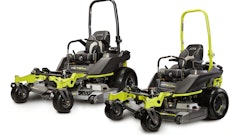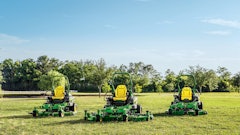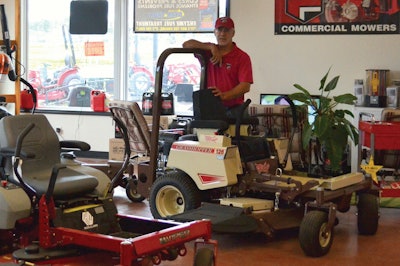
Doing business for 30 years in a small rural community, Scott Coleman of Coleman Lawn Equipment in Carbondale and Steeleville, IL, has learned that in order for his outdoor power equipment dealership to succeed, he has to see to it that his commercial customers also prosper. He has built strong relationships with the area municipalities and uses those relationships to gain accounts for his loyal contractor customer base. Outfitting those contractors for the task at hand is the key to their success.
Municipality pals
Early on as customers—especially municipalities—approached Scott for a product he did not have, he would bring it in for them. He credits this for helping him to secure municipal accounts and encourages contractors to do the same with their service offering. Being flexible and accommodating with the landscaping services you provide can open you up to new accounts and possibilities.
“We live in a very rural community filled with a lot of little towns. We were the first in our area to carry zero-turn mowers and that opened the door to all these little villages that wanted to buy zero-turn mowers,” says Scott. “Then we just started picking up the weed eaters and concrete saws and other tools municipalities were interested in, and our offering just kept growing.”
In the last few years, Scott has also added some snow removal equipment to his lineup. Going out of his way for municipalities is what keeps them purchasing from him each buying cycle.
“Every three or four years there is a trading cycle and they trade their mowers up,” explains Scott. “I know that if I take care of them during that period, then chances are they are going to try to figure out a way to buy from us again. That has gotten easier since they have raised the dollar amount for what has to be bid and what can just be bought.”
Part of taking care of those municipality customers—and landscape contractors at the same time—is paring them up when their needs and offerings align. If a municipality customer approaches Scott about outsourcing some of their work, he will have a contractor name ready to go.
“I promote contractors who buy from me to the municipalities for any work they are looking to outsource,” Scott says. “For installs, tree trimming and maintenance, I do everything I can to promote the guys who buy from me.”
Tips to equip
Scott has done a lot in his area to help new contractors get their businesses off the ground. A new cutter on the block can trust Scott to equip them with every tool they need for the job, along with a little guidance that goes a long way.
“For the guys who are just getting started in the business, I try to have everything they could possibly need to get the job done,” explains Scott. “I tell them I want this to work for you and I am going to do everything I can to help you make it. Because if they make it, I make it.”
One bit of advice Scott has for contractors is to consider stocking their trailers with a mid-mount and front-mount mower. The team of mowers packs a one-two punch for maintenance.
“I sell a lot of my commercial guys a front-deck and a mid-mount,” Scott shares. “As far as I’m concerned, that is the best scenario to have for two mowers on a trailer. The front deck will do all the dirty work down in the edge of the culverts, trimming under limbs, and is actually safer in certain zones. The mid-mount will do all the easy, flat mowing out in the open as fast as they can go.”
While Scott says front-mounted mowers can reach areas the mid-mounts cannot, running them in those tough spots could end up costing users in the long run with maintenance issues. For that reason, he sees some contractors choosing mid-mount mowers paired with a trimmer for those tough-to-reach spots.
“It’s about the cost of operation, and I think for some contractors it may be cheaper to just weed eat that area,” says Scott. “A front-deck can cost more to operate because their employees will take them where they shouldn’t. Some contractors are choosing to go mid-mount to avoid that.”
Another mower option Scott is seeing contractors choose is rear-discharge. In his area, contractors and municipalities are taking notice of the Exmark Rear-Discharge deck option. “They are buying rear-discharge desks for the security and safety,” he explains.
Scott says he noticed a trend a few years ago with cutters gravitating toward diesel for the fuel savings. He says they are now returning to gas-powered equipment as engine technology and efficiency improves.
“The fuel consumption with engines—especially with EFI technology—is getting better,” says Scott. “With improved fuel economy they are switching back to gas.”
Whatever mowers they are running, when they eventually go down, Scott has loaners available and priority service for contractors. “We provide loaner mowers and promise quick turnaround on repairs with contractors always bumped to the top of the list for service,” Scott assures.



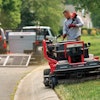
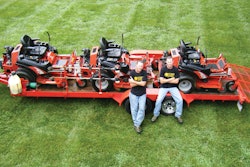
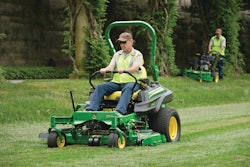
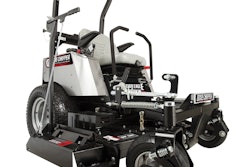

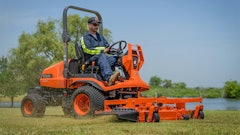







![Gravely Pro Turn Mach One My23 Dsc03139 Edit 1200x800 5b2df79[1]](https://img.greenindustrypros.com/mindful/acbm/workspaces/default/uploads/2025/10/gravely-pro-turn-mach-one-my23-dsc03139-edit-1200x800-5b2df791.BucBnDoN22.jpg?ar=16%3A9&auto=format%2Ccompress&fit=crop&h=135&q=70&w=240)


